QuestionMy cat (who is only 9 months old herself) gave birth to one kitten last night. I was with her during her whole labour as she did not want to be without me by her side.
We have handled the baby quite a bit because it was having trouble latching on. I have bought supplement just in case but the kitten seems to be okay nursing now.
My cat keeps leaving the kitten alone. We've got her closed off in our bedroom to keep her away from our other animals but she is trying to escape and even if she stays in the bedroom it's not with the baby.
We've got the heating pad under some towels with the kitten tucked in to be warm but we are concerned about the feeding and eliminating that needs to be done.
Please give us any suggestions you think appropriate.
Thanks,
Shannon
AnswerShannon,
To be completely honest I am saddened and dismayed by the fact that this very young mother was allowed to become pregnant around the time of her first heat. There are many organisations dedicated to the prevention of such "accidental pregnancies". With pet overpopulation being such a serious problem there are so many unwanted cats and kittens euthanised in animal shelters world wide simply because their time has run out and there are simply not enough good homes for all of the cats that need them. Backyard breeding or unplanned pregnancies create some heartbreaking statistics in animal shelters. I always recommend that cats and kittens are spayed and neutered as young as possible for the medical and behavioral benefits as well as the obvious benefit of population control. Medically cats who are spayed or neutered are at a substantially reduced risk for infections and cancers in their reproductive organs and they tend to be much less likely to need treatment stemming from being attacked by other domestic animals and any wildlife that they may encounter by wandering in search of a mate. Behaviorally things like annoying caterwauling and howling to advertise the availability to mate as well as a substantially reduced rate of using urine and feces for marking territory. I am very concerned about the fact that this mother kitten has had kittens at all, she is still a kitten and although she is capable to reproduce she is still growing and she is simply not mature enough to be a mom. Since cats don't typically give birth to only one kitten I would recommend first and foremost that the mother cat sees a vet as soon as possible as she may be in quite a bit of pain if there is still a kitten in the womb or birth canal. In view of the fact that the mother cat is such a young girl herself there is some potential for medical problems that may be interfering with the bonding between the newborn and young mother and issues that can cause feeding difficulties. If this is the case it may explain her reluctance to nurse and stay with the new arrival because nursing would stimulate uterine contractions if there is still a kitten that is too large to be born naturally or in a bad position to be born without assistance in the womb or birth canal. In terms of the newborn kitten I tend to recommend that a heating pad be used only on low in one portion of the bed and that the kitten can easily move away from the heat source if the little one overheats. If there are kittens that haven't been born naturally this must be found out promptly by a qualified vet and dealt with immediately for the health and safety of any remaining kittens and their mother. I would strongly suggest that you have mom spayed if she requires a caesarian so that this accident doesn't repeat itself. I would also advise that any remaining cats in your household that may become pregnant or sire a litter be spayed or neutered as soon as possible to avoid further issues like this one. It is in the best interests of any female kitten who is either too young to be spayed or access to intact male cats not be permitted because it isn't recommended that kittens have kittens. Hand rearing a kitten should only be done as a last resort as it is incredibly labor intensive and time consuming. When you take mom to the vet be sure that the baby accompanies her so that if she has to stay in hospital overnight the mom and baby stay together. Hand rearing kittens is a round the clock job. If it becomes necessary for you to care for the kitten you will need a few supplies. You can purchase a kitten milk replacer at most vet clinics and pet stores. Human baby formula or cow's milk simply aren't balanced for feeding kittens and they lack the right nutrition for kittens. I also suggest that you have cotton balls, a scale measuring in grams up to two pounds, and oral syringes. The cotton balls are meant to keep the kitten clean. You will want to bathe the kitten with warm moist cotton balls from head to toe after each feeding. You will want to start at the face and work back towards the tail. You will want to be sure that you carefully clean any food off of the kitten's face and chest area. I generally recommend that you clean the kitten's face with one cotton ball, then you will need to use another to clean the kitten's back, another for the belly and finally a few for the kitten's bottom. Very young kittens need to have their bottoms and genitals stimulated in order to go to the toilet. The mother cat normally takes care of this on her own. Be patient and be sure to wipe from genitals to bottom on the kitten to avoid cross contamination with fecal bacteria that can cause a bladder infection. It can take up to 5-10 minutes to get results from stimulating the kitten. Most kittens will pee quite readily when stimulated but pooping can take awhile. You will want to weigh the kitten every few days to be sure that he is growing properly. If the kitten is not growing properly the vet may need to assess her for any health problems. You will have to mix the formula with water as indicated in the instructions. Kittens who are hand raised will eat as often as every hour to hour and a half but I wouldn't allow the kitten to go much longer than 2-3 hours between feedings as kittens who are hand reared can have problems with their blood sugar dropping too low. Some kittens absolutely refuse to accept the bottles that are sold in pet shops. I have found that a good supply of brand new oral syringes that are cleaned after each feeding works well. When you formula feed a young kitten it is crucial that they have all four paws facing the floor and that the kitten is fed slowly enough to swallow the formula properly. If you feed a kitten on its back there is a possibility that the kitten could inhale the formula and drown. There are also products that are designed to help the kitten's good bacteria in their digestive systems at proper levels. You can mix tiny amounts of plain, unsweetened yogurt into their feedings to accomplish the same thing. I must reinforce that the mother cat's care is a better alternative for the kitten than the care that any human being can provide. Kittens who are handraised are often small for their age and can become sick with viral infections and other illnesses that the immunities in their mother's milk would generally protect them from until they are properly vaccinated. It is a good idea to ask your vet when the time would be right to deworm the kitten as most kittens are born with intestinal parasites, this isn't something that will be done for quite awhile though. If mom is normally an indoor/outdoor cat you will want to look closely for any fleas or ticks on mom or her baby as fleas and ticks can literally suck the life out of kittens. There are products that can be used to treat these external parasites on mom that will help to kill any parasites on the kitten, but don't use flea collars, flea baths or powders on mom or the baby as they can be toxic to kittens under 8+ weeks of age. I must reiterate that the mother kitten should see the vet as soon as possible as it is in the best interests of her little one born naturally, any remaining kittens that may still be alive in her womb and of course it is the best thing for mom to receive prompt medical attention for a potentially lethal problem. If the mother kitten has any retained kittens or has any sort of infection or other health issue there is substantial potential for serious health consequences like infection or even death. If you notice that mom has vaginal discharge, a fever, seems to be walking with a stiff gait, seems lethargic or her kitten seems squirmy and restless the mother and baby need to see a vet immediately as any one of these issues could prove fatal for mom and baby. I do hope that you have found this information helpful. If you have any further questions or concerns, please feel free to contact me again.

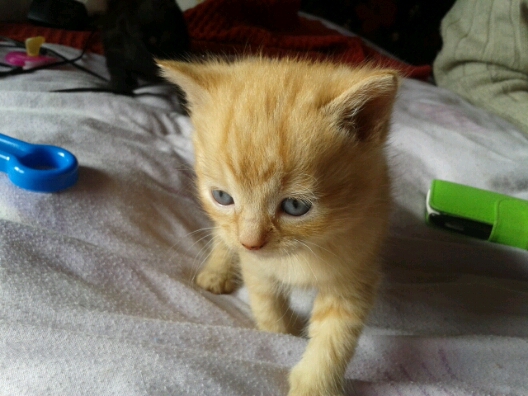 Two Kittens from different litters?
Question
Ginger Female
We wanted to get 2 kitten
Two Kittens from different litters?
Question
Ginger Female
We wanted to get 2 kitten
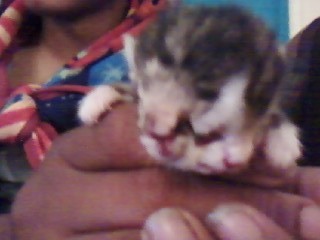 my cat had a kitten with one head and part of another with a mouth and has not nursed since she was born.
Question
my newborn kitten
my cat delivered a female ki
my cat had a kitten with one head and part of another with a mouth and has not nursed since she was born.
Question
my newborn kitten
my cat delivered a female ki
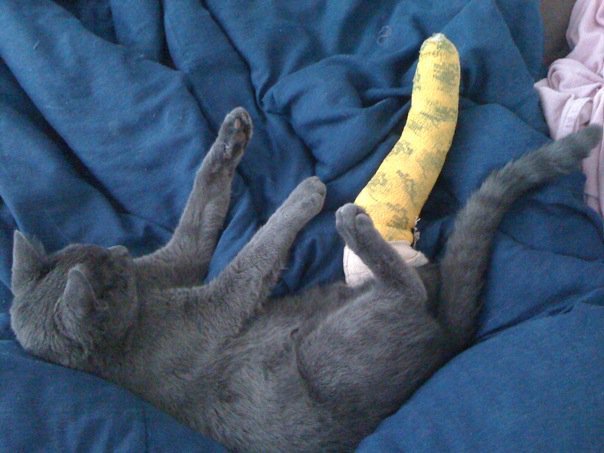 Cats broken leg and aggression
Question
Little Scout
Hello, I wanted to pose a query t
Cats broken leg and aggression
Question
Little Scout
Hello, I wanted to pose a query t
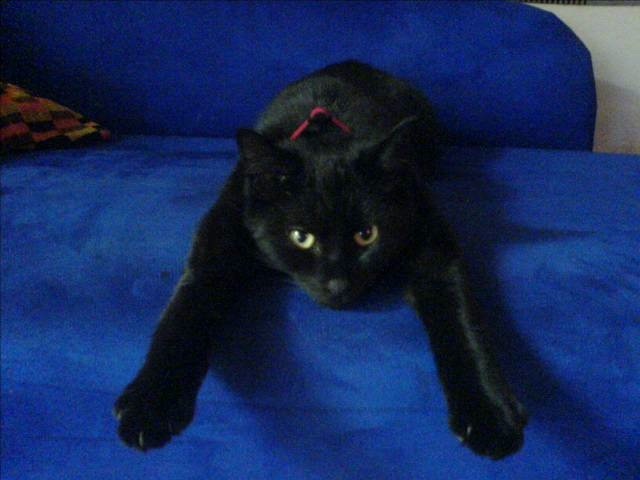 Strange litter tray behaviour
Question
Edgar
I have a beautiful two year old n
Strange litter tray behaviour
Question
Edgar
I have a beautiful two year old n
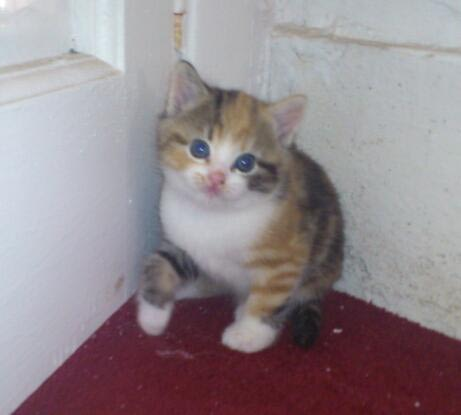 is my male kitten a tortoiseshell?
Question
our wee guy our wee guy
Hi,
I am
is my male kitten a tortoiseshell?
Question
our wee guy our wee guy
Hi,
I am